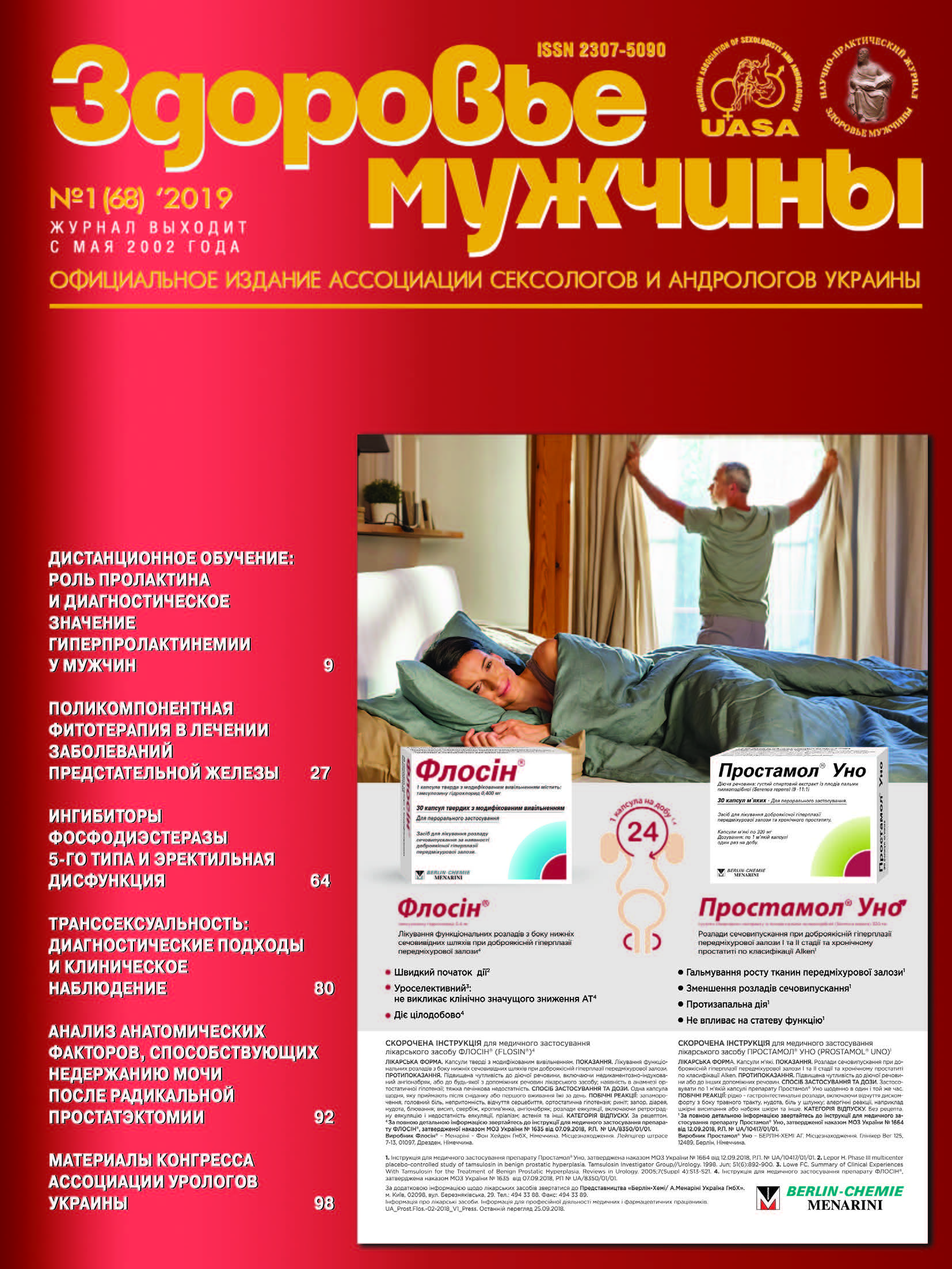Efficacy and Safety of Basic Pharmacotherapy of Chronic Abacterial Prostatitis
##plugins.themes.bootstrap3.article.main##
Abstract
A basic complex has been proposed for the treatment of chronic abacterial prostatitis (CAP), including a nonsteroidal anti-inflammatory drug to limit the effects of prostaglandins; selective alpha adrenergic blocker for modulation of the bladder overactivity and smooth muscle cells of the prostate; Serenoa repens palm fruit extract for prolonged and safe antiinflammatory and anti-sclerotic effects.
The objective: evaluation of the efficacy and safety of basic pharmacotherapy of chronic abacterial prostatitis.
Materials and methods. The study involved 32 patients with CAP. For the assessment of the patient’s condition, a questionnaires (NIH-CPSI, PHQ-9, GAD-7) and uroflowmetry were used. The ELISA revealed changes in the concentration of testosterone, dihydrotestosterone (DHT), estradiol and prostate-specific antigen (PSA) in the blood, as well as cytokine ejaculate. As a basic treatment, we used a combination of diclofenac sodium (Dicloberl retard, 100 mg/day, orally, 2 weeks), a tamsulozin with modified release (Flosin, 0.4 mg/day, orally, 1 month), an extract of palm fruit Serenoa repens (Prostamol Uno, 320 mg/day, orally, 6 months), regardless of the presence and severity of pain and dysuric manifestations in patients. The reduction of NIH-CPSI by 6 points, PHQ-9 by 6 points, GAD-7 by 5 points were considered as clinically significant.
Results. Significant favorable changes in the symptoms of prostatitis, depression and anxiety were observed after 2 weeks and persisted throughout the observation period (6 months). There was a statistically significant increase in testosterone levels, a decrease in blood DHT and PSA, as well as a significant decrease in proinflammatory cytokines in the ejaculate (IL-1β, TNF-α, IL-8), along with an increase in the antiinflammatory cytokine (IL-10). The clinical efficacy of treatment for reducing prostatitis symptoms was 69%, depression symptoms – 75%, anxiety – 84%. Side effects of therapy: ejaculation disorders were observed in 78%, epigastric pain – 10%, orthostatic hypotension – 6%, which did not prevent all patients from completing the treatment.
Conclusion. The basic pharmacotherapy was quite effective in reducing the symptoms of prostatitis, associated psychological disorders, was safe and can be recommended for patients with СAP.##plugins.themes.bootstrap3.article.details##

This work is licensed under a Creative Commons Attribution 4.0 International License.
Authors retain the copyright and grant the journal the first publication of original scientific articles under the Creative Commons Attribution 4.0 International License, which allows others to distribute work with acknowledgment of authorship and first publication in this journal.
References
Nickel J.C., Roehrborn C.G., O’Leary M.P., et al. The relationship between prostate inflammation and lower urinary tract symptoms: examination of baseline data from the reduce trial. Eur Urol. 2008; 54: 1379-1384.
Schaeffer AJ, Knauss JS, Landis JR, et al. Chronic Prostatitis Collaborative Research Network Study Group. Leukocyte and bacterial counts do not correlate with severity of symptoms in men with chronic prostatitis: the national institutes of health chronic prostatitis cohort study. J Urol. 2002; 168: 1048-1053.
Kroenke K., Spitzer R.L., Williams J.B. The PHQ-9: validity of a brief depression severity measure. J Gen Intern Med. 2001 Sep 16(9):606-613.
Spitzer R.L. et al. A brief measure for assessing generalized anxiety disorder. Arch. Intern. Med. – 2006. – № 166 (10). – P. 1092–1097.
Thakkinstian A., Attia J., Anothaisintawee T., Nickel J.C. α-blockers, antibiotics and anti-inflammatories have a role in the management of chronic prostatitis/chronic pelvic pain syndrome. BJU Int. – 2012. – № 110 (7). – Р. 1014–1022, doi:10.1111/j.1464410X.2012.11088.x Epub 2012 Apr 3
Macchione N., Bernardini P., Piacentini I., Mangiarotti B., Del Nero A. Flower pollen extract in association with vitamins (Deprox 500®) versus Serenoa repens in chronic prostatitis/chronic pelvic pain syndrome: a comparative analysis of two different treatments. Antiinflamm Antiallergy Agents Med Chem. – 2018 Nov 28. doi: 10.2174/1871523018666181128164252
Marzano R., Dinelli N., Ales V., Bertozzi M.A. Effectiveness on urinary symptoms and erectile function of Prostamev Plus® vs only extract Serenoarepens. Arch Ital Urol Androl. –2015. – Mar 31; 87 (1):25-27. doi: 10.4081/aiua.2015.1.25.
Chiavaroli A., Recinella L., Ferrante C. Crocus sativus, Serenoa repens and Pinus massoniana extracts modulate inflammatory response in isolated rat prostate challenged with LPS. J Biol Regul Homeost Agents. – 2017. – Jul-Sep,;31(3):531-541.
Barry M.J., Meleth S., Lee J.Y. et al. Effect of increasing doses of Saw Palmetto on lower urinary tract symptoms: a randomized trial. JAMA. – 2011. – Sep 28; 306 (12): 1344–1351. doi: 10.1001/jama.2011.1364.
Alexander R.B., Propert K.J., Schaeffer A.J. et al. Ciprofloxacin or tamsulosin in men with chronic prostatitis/chronic pelvic pain syndrome: a randomized, double-blind trial. Ann. Intern. Med. – 2004. – 141: 581–589.
Nickel J.C., O’Leary M.P., Lepor H. et al. Silodosin for men with chronic prostatitis/chronic pelvic pain syndrome: results of a Phase II multicenter, doubleblind, placebo-controlled study. J. Urol. – 2011. – 186: 125–131.
Nickel J.C., Narayan P., McKay J., Doyle C. Treatment of chronic prostatitis/chronic pelvic pain syndrome with tamsulosin: a randomized double blind trial. J. Urol. – 2004. – 171: 1594–1597.
Nickel J.C., Pontari M., Moon T. et al. A randomized, placebo controlled, multicenter study to evaluate the safety and efficacy of rofecoxib in the treatment of chronic nonbacterial prostatitis. J. Urol. – 2003; – 169: 1401–1405.
Hu С., Yang H., Zhao Y. The role of inflammatory cytokines and ERK1/2 signaling in chronic prostatitis/chronic pelvic pain syndrome with related mental health disorders. Sci Rep. 2016; 6: 28608. Published online 2016 Jun 23. doi: 10.1038/srep28608.
Shulyak A, Gorpynchenko I, Drannik G, et al. The effectiveness of the combination of rectal electrostimulation and an antidepressant in the treatment of chronic abacterial prostatitis. Cent European J Urol. 2019; 72: 66-70.
Zhang M, Li H, Ji Z, Dong D, Yan S. Clinical study of duloxetine hydrochloride combined with doxazosin for the treatment of pain disorder in chronic prostatitis/chronic pelvic pain syndrome: An observational study. Medicine(Baltimore). 2017. Available from: https://www.ncbi.nlm.nih.gov/pubmed/28272220.





